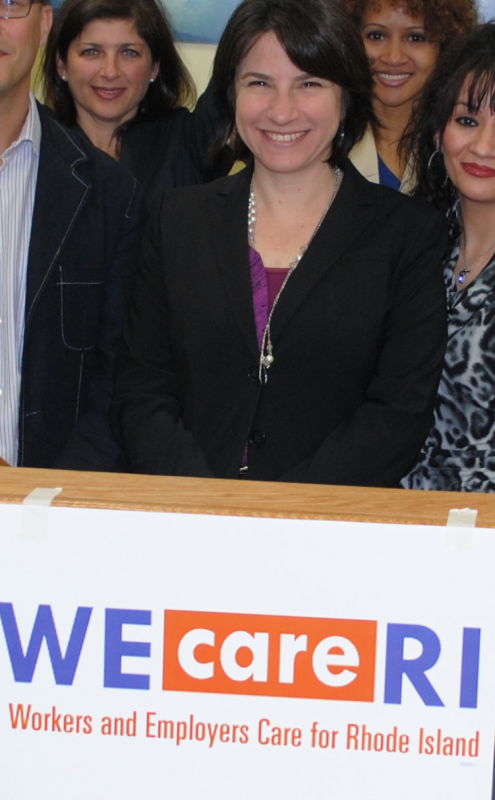Federal budgets conjure up huge volumes of paper and mind-bending columns of numbers. That wasn’t the case on May 29, when some grassroots leaders from Family Values @ Work had a chance to speak to Congress about a small item in the budget that would have a huge impact on their states.
The item was the State Paid Leave Fund, a $5 million appropriations put in the budget by President Obama so states could apply for start-up funds to launch Family and Medical Leave Insurance Funds.
As Wendy Chun-Hoon, DC Director for Family Values @ Work, reminded the staffers, too many families – especially in this economy – cannot afford to take unpaid leave. Over the past decade, two and a half times as many people as in 2000 who were eligible for and needing FMLA leave didn’t take it, mostly because they couldn’t afford to go without pay. About a third of those who did take leave took less time than they needed. And many were unable to provide care to a loved one.
Permelia Toney-Boss, a unit coordinator at Rutgers University in New Jersey, knows what that feels like. The first time she had cancer surgery, her daughter was able to take a day here and there, accompanying her mother to biopsies and other tests, but she couldn’t give the kind of care that was needed. 
“When you get that kind of news,” Permelia testified, “it’s really hard to digest – and then you have to turn around and explain it to your family members. It’s devastating. You have surgery and don’t know if you’re going to wake up. You feel your life is over – I wasn’t ready to go, I have children and grandchildren.”
The following year she needed a hysterectomy and really wanted someone she’d feel comfortable with to give the personal care that was needed. This time Permelia, vice-president of her local union, got her daughter information about the state’s new Family Leave Insurance program.
“With the extended leave for the second surgery, my daughter could afford to be there with me all the time. She knew me, knew my tastes. I feel I healed faster because she was there. Most of my family have the types of jobs, if you don’t go to work, you don’t get paid. So this made a big difference for their peace of mind as well. Family Leave Insurance helped my daughter take care of her daughter and her financial obligations while she was taking care of me. She said the first time it was really hard to work, wondering what was going on with me at home.”
Permelia urged the staffers to tell Senators to include this item in the budget. “It would be extremely beneficial for families, especially poor families, so they can care for a loved one and still carry on their obligations at home, instead of having to sit at their job and wonder when the phone is going to ring, what they’re going to hear.”
Joining Permelia and Wendy were two other speakers. Dr. Ruth Milkman, Professor of Sociology, CUNY Graduate Center, shared research showing what an impact the two existing state programs in California and New Jersey have had – how they help to narrow gender inequalities, improve workforce attachment, facilitate stronger parent-child bonding, improve the health of babies as well as seriously ill kin. Experience with the program has erased business fears; employers found it had a positive or no impact on productivity and profitability. Many employers have enjoyed cost savings from the program.
One benefit has been the increase in use by men over time, especially for younger workers. And the concept is a political winner: polling data shows strong support across all demographic categories.
Rhode Island Senator Gayle Goldin shared her own story with the audience and described her efforts to pass a Temporary Care Insurance program in her state – something a grant from this fund would help enormously.
On a visit to her sister, Sen. Goldin had a freak accident and suffered a broken back. Thanks to her state’s temporary disability insurance program, she was able to afford the time to heal. The program did not apply to her husband, however. “We had just bought our house, had years to go on our student loans, and were waiting to become adoptive parents,” she said, “so we knew we couldn’t handle a significant change to our income. I tell you this because no one expects the crazy stuff to happen.”
Sen. Goldin went on to describe the bill she’s sponsoring. “Ensuring families can stay in the work force – and afford to handle the welcome addition of a child or the life-changing event of a serious illness- will keep our families from falling deeper into economic hard times,” she said.
A grant from this fund, if it passes, would enable Rhode Island to buy software, hire a few new employees to administer the program, do outreach to employers to let them know about the new benefits, and develop stronger evaluation systems.
On the twentieth anniversary of FMLA in February, President Obama urged us to “recommit ourselves to the values that inspired the law and redouble our efforts on behalf of fairer workplaces and healthier, more secure families.” This State Paid Leave Fund would be an important step in that direction.
Call your Congressperson at 1-888-866-2561. Urge them to support the State Paid Leave Fund in the budget.